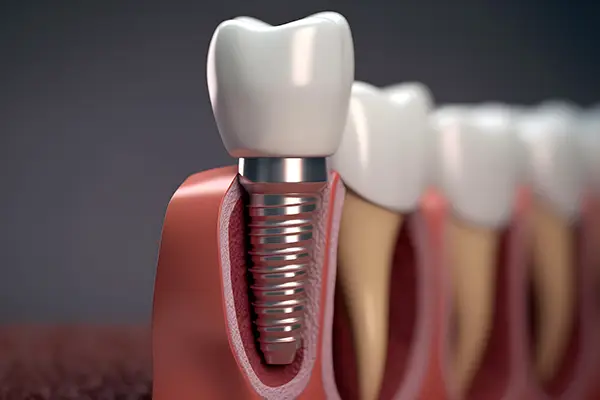After Implant Placement
San Diego, CA
 Dental implants are an effective and long-lasting solution for replacing missing teeth. Whether you are missing one tooth or several, dental implants provide a natural-looking and functional replacement. However, the process doesn't end with dental implant placement; proper aftercare is crucial for ensuring the success and longevity of the implant. At Mission Hills Periodontics we will walk you through everything you need to know about what happens after dental implant placement, including healing time, care instructions, and potential concerns. Dental implants are an effective and long-lasting solution for replacing missing teeth. Whether you are missing one tooth or several, dental implants provide a natural-looking and functional replacement. However, the process doesn't end with dental implant placement; proper aftercare is crucial for ensuring the success and longevity of the implant. At Mission Hills Periodontics we will walk you through everything you need to know about what happens after dental implant placement, including healing time, care instructions, and potential concerns.
When Are Dental Implants Needed?
Dental implants are typically recommended for individuals who have lost one or more teeth due to injury, decay, or gum disease. They provide a durable and aesthetically pleasing solution that restores both tooth function and appearance. Unlike traditional dentures or bridges, implants integrate with the jawbone, offering a more stable and permanent option.
People who may benefit from dental implants include those who:
| • |
Have missing teeth that affect their ability to chew or speak properly
|
| • |
Are unhappy with traditional dentures due to discomfort or instability
|
| • |
Want to prevent bone loss that occurs after tooth loss
|
| • |
Are looking for a long-term tooth replacement option |
What Are the Different Types of Dental Implants?
Dental implants come in various types, depending on the number of teeth being replaced and the patient's specific needs. The two primary categories include single tooth and multiple tooth dental implants.
Single Tooth Dental Implant
A single tooth dental implant is used to replace an individual missing tooth. This option consists of three main components: a titanium implant post, an abutment, and a custom-made crown. This type of implant closely mimics a natural tooth and does not require support from surrounding teeth, making it a preferred alternative to traditional bridges.
Multiple Tooth Dental Implant
For individuals missing multiple teeth, multiple tooth dental implants provide a more secure and natural-looking solution compared to removable partial dentures. These implants can support a bridge or denture, ensuring better stability and reducing bone loss. Depending on the patient's needs, multiple implants may be placed to anchor a fixed bridge or a full-arch restoration.
What is the Dental Implant Procedure?
The dental implant procedure is typically performed in multiple stages and may take several months to complete. Here's a general overview of the process:
| • |
Initial Consultation: Your dentist evaluates your oral health, takes X-rays, and determines if you are a good candidate for dental implants.
|
| • |
Tooth Extraction (if needed): If a damaged tooth is still present, it will be removed before implant placement.
|
| • |
Bone Grafting (if needed): In cases where the jawbone is insufficient to support an implant, a bone graft may be performed to strengthen the area.
|
| • |
Implant Placement: The titanium post is surgically inserted into the jawbone, where it will integrate with the bone over time (osseointegration).
|
| • |
Healing Period: This phase lasts several months as the bone and implant fuse together.
|
| • |
Abutment Placement: Once healing is complete, an abutment is attached to the implant to connect it to the final restoration.
|
| • |
Crown or Prosthetic Placement: The custom-made crown, bridge, or denture is placed onto the abutment, completing the procedure. |
What Happens After Dental Implant Placement?
The Healing Process
After implant placement, the healing process, known as osseointegration, begins. This process allows the implant to fuse with the jawbone, creating a strong foundation for the final restoration. Healing typically takes between three to six months, depending on the patient's overall health, bone density, and adherence to post-operative care instructions.
Diet
During the initial healing period, it is important to follow dietary guidelines to prevent unnecessary pressure on the implant site. Patients should adhere to a soft-food diet and avoid hard, crunchy, or sticky foods for at least a few weeks. Recommended foods include mashed potatoes, yogurt, smoothies, scrambled eggs, soft-cooked vegetables, soup, and oatmeal. As healing progresses, you can gradually reintroduce firmer foods into your diet based on your dentist's recommendations.
How Do I Care for My Dental Implants?
Proper care is essential to ensure the success of your dental implants. Follow these steps to maintain optimal oral hygiene:
| • |
Brush your teeth at least twice a day using a soft-bristled toothbrush and non-abrasive toothpaste.
|
| • |
Floss daily using unwaxed dental floss or a water flosser to clean around the implant.
|
| • |
Use an antimicrobial mouthwash to reduce bacteria and prevent infection.
|
| • |
Avoid smoking and excessive alcohol consumption, as these can impair healing and increase the risk of implant failure. |
How Often Do I Need to Visit the Dentist?
Regular dental checkups are crucial for monitoring the health of your implants. Your dentist will recommend follow-up appointments to assess healing progress and ensure the implant is integrating properly. After the initial healing phase, it is advised to visit your dentist at least twice a year for routine exams and professional cleanings.
How Long Will My Dental Implants Last?
With proper care, dental implants can last a lifetime. The titanium post itself is designed to be a permanent fixture in the jawbone. However, the crown or prosthetic attached to the implant may need replacement every 10 to 15 years due to normal wear and tear. Maintaining good oral hygiene and attending regular dental visits will significantly extend the lifespan of your dental implants.

How Do I Know If There Is a Problem With My Dental Implants?
While dental implants have a high success rate, complications can occasionally occur. It is important to be aware of potential signs of implant failure or infection, including:
| • |
Persistent pain or discomfort beyond the normal healing period
|
| • |
Swelling, redness, or pus around the implant site
|
| • |
Difficulty chewing or biting down
|
| • |
A loose implant or shifting sensation
|
| • |
Gum recession around the implant |
If you experience any of these symptoms, contact us dentist immediately for an evaluation. Early intervention can prevent further complications and improve the chances of successful treatment.
Dental implants are a reliable and effective solution for tooth replacement, but proper aftercare is essential for their long-term success. By following your dentist's instructions, maintaining good oral hygiene, and scheduling regular checkups, you can ensure the longevity of your implants and enjoy a healthy, confident smile for years to come. If you have any questions or concerns about your dental implants, don't hesitate to reach out to Mission Hills Periodontics.
|
